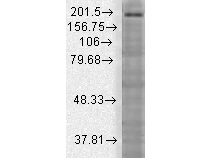Datasheet is currently unavailable. Try again or CONTACT US
SHANK3 Antibody
Mouse Monoclonal S69 IgG2b
200-301-G45
100 µg
Liquid (sterile filtered)
WB, IHC, IF, IP
Human, Mouse, Rat
Mouse
Shipping info:
$50.00 to US & $70.00 to Canada for most products. Final costs are calculated at checkout.
Product Details
Anti-SHANK3 (MOUSE) Monoclonal Antibody - 200-301-G45
Shank3, Prosap2, SH3 and multiple ankyrin repeat domains protein 3, Proline-rich synapse-associated protein 2
Mouse
Monoclonal
IgG2b
Target Details
Shank3 - View All Shank3 Products
Human, Mouse, Rat
Conjugated Peptide
SHANK3 Antibody was produced in mice by repeated immunizations raised against a synthetic peptide corresponding to an internal region of rat Shank3.
Anti-SHANK3 Antibody was purified by Protein G chromatography. A BLAST analysis was used to suggest cross-reactivity with SHANK3 from human, mouse, and rat based on 100% homology with the immunizing sequence. No cross-reactivity against Shank1 or Shank2. Cross-reactivity with SHANK3 from other sources has not been determined. Scaffolds research.
Q9JLU4 - UniProtKB
NP_067708.1 - NCBI Protein
Application Details
IF, IHC, IP, WB
Anti-SHANK3 Antibody is tested for use in WB, IHC, IF, and IP. Expect a band approximately ~190kDa on specific lysates. Specific conditions for reactivity should be optimized by the end user.
Formulation
1.0 mg/mL by UV absorbance at 280 nm
0.02 M Potassium Phosphate, 0.15 M Sodium Chloride, pH 7.2
0.09% (w/v) Sodium Azide
50% (v/v) Glycerol
Shipping & Handling
Dry Ice
Store vial at -20° C prior to opening. Aliquot contents and freeze at -20° C or below for extended storage. Avoid cycles of freezing and thawing. Centrifuge product if not completely clear after standing at room temperature. This product is stable for several weeks at 4° C as an undiluted liquid. Dilute only prior to immediate use.
Expiration date is one (1) year from date of receipt.
Shank proteins make up a family of scaffold proteins identified through their interaction with a variety of membrane and cytoplasmic proteins. Shank proteins at postsynaptic sites of excitatory synapses play roles in signal transmission into the postsynaptic neuron. Shank proteins are also crucial in receptor tyrosine kinase signaling; specifically, Shank3 can mediate Erk-MAPK and P13K signaling which is crucial for tubule formation.
Shank3 is also one of the latest genes to be associated with autism. A mutation of a single copy of Shank3 on chromosome 22q13 can result in language and/or social communication disorders.
This product is for research use only and is not intended for therapeutic or diagnostic applications. Please contact a technical service representative for more information. All products of animal origin manufactured by Rockland Immunochemicals are derived from starting materials of North American origin. Collection was performed in United States Department of Agriculture (USDA) inspected facilities and all materials have been inspected and certified to be free of disease and suitable for exportation. All properties listed are typical characteristics and are not specifications. All suggestions and data are offered in good faith but without guarantee as conditions and methods of use of our products are beyond our control. All claims must be made within 30 days following the date of delivery. The prospective user must determine the suitability of our materials before adopting them on a commercial scale. Suggested uses of our products are not recommendations to use our products in violation of any patent or as a license under any patent of Rockland Immunochemicals, Inc. If you require a commercial license to use this material and do not have one, then return this material, unopened to: Rockland Inc., P.O. BOX 5199, Limerick, Pennsylvania, USA.

